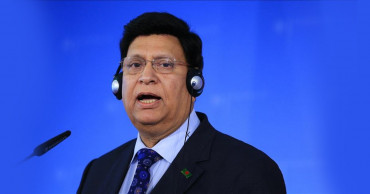UN General Assembly
UN General Assembly adopts Bangladesh’s landmark resolution on culture of peace
The United Nations General Assembly has adopted Bangladesh’s flagship resolution titled, 'Follow-up to the Declaration and Programme of Action on a Culture of Peace', with an overwhelming cross-regional support by UN Member States.
During Friday’s session, the Permanent Representative of Bangladesh introduced the resolution emphasising the critical importance of nurturing a culture of peace in everyday life, particularly in the context of increasing global challenges and lack of empathy amongst nations.
Hundreds of Muslims unlawfully expelled to Bangladesh by India: HRW
The resolution was co-sponsored by 96 Member States from across the region, said the Bangladesh Mission in a media release on Saturday.
Originally adopted in 1999 at the initiative of Bangladesh, the resolution promotes values such as respect for diversity, tolerance, solidarity and non-violence.
It provides a framework for countries to promote peace through education, dialogue and cooperation.
7 months ago
UNGA Resolution on Ukraine: 32 countries including Bangladesh, India and China abstain
The UN General Assembly has adopted a resolution that demands Russia leave Ukraine.
Thirty-two countries including Bangladesh, India, China, Pakistan and Sri Lanka abstained from voting while seven countries including Russia voted against the resolution.
A total of 141 countries voted in favour of the resolution.
The U.N. General Assembly approved the non-binding resolution Thursday that calls for Russia to end hostilities in Ukraine and withdraw its forces, sending a strong message on the eve of the first anniversary of the invasion that Moscow's aggression must stop, reports AP.
The resolution, drafted by Ukraine in consultation with its allies, passed 141-7, with 32 abstentions.
Read more: China calls for Russia-Ukraine cease-fire, peace talks
Ukrainian Foreign Minister Dmytro Kuleba said the vote was more evidence that not only the West backs his country.
“This vote defies the argument that the global south does not stand on Ukraine’s side," Kuleba said. "Many countries representing Latin America, Africa, Asia voted in favor.”
The General Assembly has become the most important U.N. body dealing with Ukraine because the Security Council, which is charged with maintaining international peace and security, is paralyzed by Russia’s veto power. General Assembly resolutions are not legally binding, unlike Security Council resolutions, but serve as a barometer of world opinion.
The seven countries voting against Thursday's resolution were Belarus, Nicaragua, Russia, Syria, North Korea, Eritrea and Mali, which has developed close military ties with Russia. Amendments proposed by Belarus would have weakened or stripped much of the language but were resoundingly defeated.
The vote was slightly below the highest total for the five previous resolutions approved by the 193-member world body since Russia sent troops and tanks across the border into its smaller neighbor on Feb. 24, 2022. That tally, in an October resolution against Russia’s illegal annexations, won approval by 143 countries.
Foreign ministers and diplomats from more than 75 countries addressed the assembly during two days of debate, with many urging support for the resolution that upholds Ukraine’s territorial integrity, a basic principle of the U.N. Charter that all countries must subscribe to when they join the world organization.
The war has killed tens of thousands on both sides and has reduced entire Ukrainian cities to ruins and its impact has been felt worldwide in higher food and fuel costs and rising inflation.
Venezuela’s deputy ambassador addressed the council on behalf of 16 countries that either voted against or abstained on almost all of five previous resolutions on Ukraine: Belarus, Bolivia, Cambodia, China, Cuba, Eritrea, Equatorial Guinea, Iran, Laos, Mali, Nicaragua, North Korea, St. Vincent, Syria, Venezuela and Zimbabwe.
3 years ago
UN approves resolution calling for Russia to leave Ukraine
The U.N. General Assembly approved a nonbinding resolution Thursday that calls for Russia to end hostilities in Ukraine and withdraw its forces, sending a strong message on the eve of the first anniversary of the invasion that Moscow's aggression must stop.
The resolution, drafted by Ukraine in consultation with its allies, passed 141-7, with 32 abstentions.
Read more: China calls for Russia-Ukraine cease-fire, peace talks
Ukrainian Foreign Minister Dmytro Kuleba said the vote was more evidence that not only the West backs his country.
“This vote defies the argument that the global south does not stand on Ukraine’s side," Kuleba said. "Many countries representing Latin America, Africa, Asia voted in favor.”
The General Assembly has become the most important U.N. body dealing with Ukraine because the Security Council, which is charged with maintaining international peace and security, is paralyzed by Russia’s veto power. General Assembly resolutions are not legally binding, unlike Security Council resolutions, but serve as a barometer of world opinion.
The seven countries voting against Thursday's resolution were Belarus, Nicaragua, Russia, Syria, North Korea, Eritrea and Mali, which has developed close military ties with Russia. Amendments proposed by Belarus would have weakened or stripped much of the language but were resoundingly defeated.
Read more: No economic ‘knockout’ yet from West’s sanctions on Russia
The vote was slightly below the highest total for the five previous resolutions approved by the 193-member world body since Russia sent troops and tanks across the border into its smaller neighbor on Feb. 24, 2022. That tally, in an October resolution against Russia’s illegal annexations, won approval by 143 countries.
Foreign ministers and diplomats from more than 75 countries addressed the assembly during two days of debate, with many urging support for the resolution that upholds Ukraine’s territorial integrity, a basic principle of the U.N. Charter that all countries must subscribe to when they join the world organization.
The war has killed tens of thousands on both sides and has reduced entire Ukrainian cities to ruins and its impact has been felt worldwide in higher food and fuel costs and rising inflation.
Venezuela’s deputy ambassador addressed the council on behalf of 16 countries that either voted against or abstained on almost all of five previous resolutions on Ukraine: Belarus, Bolivia, Cambodia, China, Cuba, Eritrea, Equatorial Guinea, Iran, Laos, Mali, Nicaragua, North Korea, St. Vincent, Syria, Venezuela and Zimbabwe.
Read more: Putin raises tension on Ukraine, suspends START nuclear pact
While other countries focused on Russia’s actions, Venezuelan Deputy Ambassador Joaquín Pérez Ayestarán said Wednesday that all countries without exception “must stringently comply with the United Nations Charter,” a barely veiled dig at an international order long dominated by the U.S. and Europe, and at what some call violations of the charter.
Ayestarán said the countries in his group were against what he called divisive action in the General Assembly, and for “a spirit of compromise.”
European Union foreign policy chief Josep Borrell told reporters that the aggressor and the victim can’t be put on equal footing.
“Russia has not sent any positive signal of any minimum willingness to work for a peace,” Borrell said. Instead, Russia is intensifying attacks, firing 50,000 rounds every day, and has put 300,000 soldiers on the front lines, double the 150,000 it massed before the invasion, he said.
Facing this reality, Borrell said, the EU and the West have to support Ukraine militarily, impose sanctions on Russia, and try to isolate Moscow diplomatically which is what Kyiv’s supporters are trying to do at the United Nations this week.
Read more: Global impact: 5 ways war in Ukraine has changed the world
China’s deputy U.N. ambassador, Dai Bing, told the assembly Thursday: “We support Russia and Ukraine in moving towards each other. ... The international community should make joint efforts to facilitate peace talks.”
China says it is neutral in the conflict and an advocate of peace talks, but has not criticized the invasion or described it as such. Beijing has condemned the U.S. and its allies over sanctions on Moscow and military assistance to Ukraine. China and Russia have increasingly aligned their foreign policies to oppose the U.S.-led international order.
Chinese Foreign Minister Wang Yi reaffirmed the strength of those ties when he met Russian leader Vladimir Putin during a visit to Moscow this week.
More broadly, Russia and Ukraine have been trying to win support from around the world.
The head of Ukrainian President Volodymyr Zelenskyy’s presidential office, Andriy Yermak, spoke Tuesday about the U.N. resolution with India's national security adviser because “Ukraine is interested in the broadest possible support for the resolution, in particular from the countries of the global south,” a statement from Zelenskyy’s office said.
India had a Cold War dependence on the Soviet Union and has abstained several times from voting on U.N. Security Council resolutions demanding that Russia cease its invasion.
Less-powerful countries, including many in Africa, also have been caught up in the diplomatic wrangling.
“We were colonized, and we forgive those who colonized us. Now the colonizers are asking us to be enemies with Russia, who never colonized us; is that fair?” Uganda’s foreign minister, Abubaker Jeje Odongo, told the Sputnik news agency this month.
Russia is Africa’s top arms supplier and Odongo also noted that most of his country’s military equipment is Russian-made.
“Countries in Africa have traditionally been attached in the Cold War division to the Soviet Union, having the old nostalgia, but also Russia has good tools, how to motivate them to be on their side,” Slovak Foreign Minister Rastislav Káčer told reporters in New York on Thursday. “And then there are others, like China, who are big powers, and are very carefully following what’s going on, and calculating what’s good for them.”
3 years ago
Momen to be part of PM’s entourage during upcoming UK, US visits
Foreign Minister Dr AK Abdul Momen will be accompanying Prime Minister Sheikh Hasina during her upcoming visits to London, New York and Washington, said an official of the foreign ministry.
Momen was not part of the PM’s entourage during her just-concluded state visit to India (September 5-8), citing “health reasons”.
The Prime Minister is scheduled to visit the United Kingdom and the United States from September 15 to September 30, according to the Ministry of Foreign Affairs.
The seventy-seventh session of the UN General Assembly opens on September 13 with the theme, “A watershed moment: transformative solutions to interlocking challenges.”
Read: Momen not accompanying PM in India: Dipu Moni questions media’s use of “dropped”
The theme stems from the recognition that the world is at a critical moment in the history of the United Nations due to complex and interconnected crises, including the COVID-19 pandemic, the war in Ukraine, humanitarian challenges of unprecedented nature, a tipping point in climate change as well as growing concerns about threats to the global economy.
At the UN General Assembly, on September 20, heads of states and governments will explore solutions to the outstanding global challenges.
This year’s general debate, which runs through September 26, is expected to be fully in-person.
Read: Dhaka, Delhi likely to sign 7 deals, MoUs during PM's India visit: FM
3 years ago
Global efforts must be enhanced to save lives, reduce risks of migrants: Shahriar Alam
State Minister for Foreign Affairs Md Shahriar Alam has said global efforts must be enhanced to save lives and reduce risks and vulnerabilities of migrants during their migratory journey, including those caught up in situations of crisis.
He was delivering national statement at the general debate of the International Migration Review Forum (IMRF) at the UN General Assembly on Thursday. Shahriar Alam urged transit and destination countries not to forcibly return migrants under any circumstances.
Also read:It's a priority for IFAD to invest in Bangladesh, says its regional director
3 years ago
Investing in prevention smarter than responding to consequences of conflict: Dhaka
Ambassador-at-large Mohammad Ziauddin has said investing in prevention is always “better and smarter” than responding to the consequences of conflict.
He was speaking at the first ever high-level meeting of the UN General Assembly on Financing for Peacebuilding held at the UN on Wednesday.
Also read:Dhaka calls for increased funding to support peacebuilding in conflict-torn countries
The meeting brought together member states, leaderships from the UN General Assembly, Security Council, ECOSOC and Secretariat, international financial institutions (IFIs) and civil society organizations to explore and advance adequate, predictable, and sustained financing for peace building.
As the chair of the Peacebuilding Commission Ambassador Rabab Fatima also delivered a statement on behalf of the Commission, which contained some practical recommendations for consideration of the General Assembly regarding peace building financing.
The financing for peace building is a longstanding concern. With rising poverty, inequalities, and further exacerbation of pre-existing vulnerabilities caused by the COVID 19 pandemic, the situation has worsened, according to a message received here from Bangladesh Mission in New York.
“This high-level meeting provides an opportunity for the Assembly to consider all options for peace building financing, such as, voluntary and assessed contributions as well as innovative sources, to make real progress in this matter,” said Ambassador Ziauddin.
The Ambassador-at-large referred to Bangladesh’s own experience of successful nation-building and said Bangladesh was born out of a devastating war.
“Our only capital for post-war nation-building was our human capital and resilience. Overcoming many daunting challenges Bangladesh has achieved remarkable socio-economic progress," he said.
3 years ago
Momen defends Dhaka's yes vote on Ukraine resolution as humane
Foreign Minister AK Abdul Momen on Friday defended its voting in favour of the latest resolution adopted by the UN General Assembly on the humanitarian situation in Ukraine saying Bangladesh remains very vocal on humanitarian issues.
“We voted on humanitarian grounds. We’re known as a humane country in the world. We remain very vocal on humanitarian issues. So, we agreed and voted in favour of the resolution,” he told reporters after attending a function in the city.
Momen referred to Prime Minister Sheikh Hasina’s generosity in hosting over 1.1 million Rohingyas and said she is now known as “mother of humanity.”
Read:Diplomats visit Tungipara to pay tribute to Bangabandhu
Asked why Bangladesh abstained in the previous resolution (March 2), the FM said that one was one-sided in which Russia was accused squarely.
“But war does not take place by one side. You can’t clap in one hand. We felt it was very much partisan and war will not stop with such a resolution. To stop war both parties need to come forward with equal sincerity,” Momen said.
At a media briefing on Thursday morning, Ambassador of Russia to Bangladesh Alexander Mantytskiy said Russia highly appreciates Bangladesh’s “responsible and balanced” attitude towards the earlier resolution.
“We express gratitude to the Bangladeshi side for its neutral position taken despite the enormous external pressure during the said voting,” he said.
3 years ago
Global Media and Information Literacy Week observed amid Covid 'infodemic'
The Global Media and Information Literacy Week, commemorated annually, ended Sunday which is a major occasion for stakeholders to review and celebrate the progress achieved towards "Media and Information Literacy for All."In 2021 the UN General Assembly decided to commemorate the week (October 24-31), citing the need for the dissemination of factual, timely, targeted, clear, accessible, multilingual and science-based information.The resolution recognises that the substantial digital divide and data inequalities that exist among different countries and within them can be addressed in part by improving people's competencies to seek, receive and impart information in the digital realm, said the UN Information Centre in Dhaka Sunday.The theme of this year was "Media and Information Literacy for the Public Good." During the Global Media and Information Literacy Week, the Department of Global Communication of the United Nations together with Purpose organised an event on fighting the Covid-19 Infodemic to highlight the lessons learned over the last 18 months around the Verified initiative.Since May 2020, Verified has reached over 1 billion people around the world with reliable, accurate information about Covid-19.In 2021, the campaign has moved towards a model that centres communications efforts on reaching vulnerable populations who have not yet been reached or have not responded to traditional public health communications.The 90-minute virtual event was held Thursday and brought together panelists representing governments, the private sector, the entertainment industry and the Brazilian Olympic Team who have all been close collaborators in our work this year.The aim of the event was to exchange experiences of Verified partners and collaborators and to further encourage their engagement with the Verified campaign.In the current ecosystem of complex and sometimes contradictory messages and meanings, it is hard to conceive of the public good being advanced, if the public is disempowered in the face of opportunities and threats.Each individual needs to be equipped with media and information literacy competencies to understand the stakes and to contribute to and benefit from information and communication opportunities.
4 years ago
Covid: Dhaka advocates an equal shot at recovery
Bangladesh has called for universal and affordable access to Covid vaccines to ensure an equitable and sustainable global recovery from the ravages of the pandemic.
Echoing Prime Minister Sheikh Hasina's recent remarks at the UN General Assembly, Bangladesh Permanent Representative to the UN Ambassador Rabab Fatima said that "sharing the vaccine technology with the capable developing countries" for boosting jab production could ensure vaccine equity.
Read:Bangladesh trade facilitation initiative launched
Ambassador Fatima made the remarks while addressing the General Debate of the Second Committee of the 76th Session of the United Nations General Assembly at the General Assembly Hall on Wednesday.
The Second Committee adopted the theme, 'Crisis, Resilience and Recovery- Accelerating Progress towards the 2030 Agenda' for its debate this year against the backdrop of the double jeopardy of the pandemic and global climate change.
The theme aims to promote bold and ambitious global roadmap for sustainable and resilient recovery from the pandemic and for the achievement of 2030 agenda in a timely manner.
Mentioning the recent initiatives taken by the global community for tackling the challenges posed by climate change, Ambassador Fatima emphasised on building up on the momentum to achieve bold and ambitious outcomes during the upcoming Climate and Biodiversity COPs.
Read: 2 lakh AstraZeneca doses to reach Dhaka from Maldives Wednesday
4 years ago
Bangladesh’s UNGA participation shows its stronger presence in multilateral forum: Officials
Bangladesh has once again demonstrated its “stronger and diversified” presence in multilateral forum through in-person participation during the 76th UN General Assembly (UNGA), officials said.
“Bangladesh’s participation at the UNGA led by Prime Minister Sheikh Hasina has further elevated the country’s stronger and vibrant presence in multilateral forum,” said a senior official.
UN General Assembly President Abdulla Shahid closed the UN High-Level session, crediting “sound mitigation measures” and high vaccination rates for its success.
Earlier, the UNGA President invited Bangladesh's Permanent Representative (PR) to the United Nations Ambassador Rabab Fatima to chair part of the general debate of the UN General Assembly’s 76th session.
4 years ago







.jpg)
.jpg)





